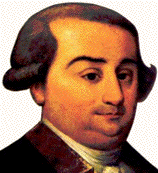March 15: Cesare Beccaria
Cesare Beccaria (1738)
It was on this date, March 15, 1738, the famous Italian legal reformer Cesare, Marquis of Beccaria-Bonesana, was born in Milan. He opposed the death penalty and believed education would reduce crime – a belief borne out in practice so frequently to this day that only a Christian Dominionist would dispute it. Beccaria’s guiding principle was reason and his chief publication, Dei delitti e delle pene (On Crimes and Punishments) greatly influenced the development of Jeremy Bentham’s Utilitarian philosophy. He was read by John Adams and Thomas Jefferson, as well as Catherine II (Catherine the Great) of Russia.Beccaria believed, with the French social commentator and political thinker Montesquieu, that "every punishment which does not arise from absolute necessity is tyrannical." As for Beccaria's religion, he was a discrete freethinker. Indeed, he wrote to the André Morellet* that he "heard the noise of the chains rattled by superstition and fanaticism," which would seem to place him in the column of the decidedly skeptical.
* Charles de Flahaut, Mémoires Inedits de L'Abbé Morellets, Paris, 1822.
Originally published March 2003 by Ronald Bruce Meyer.


